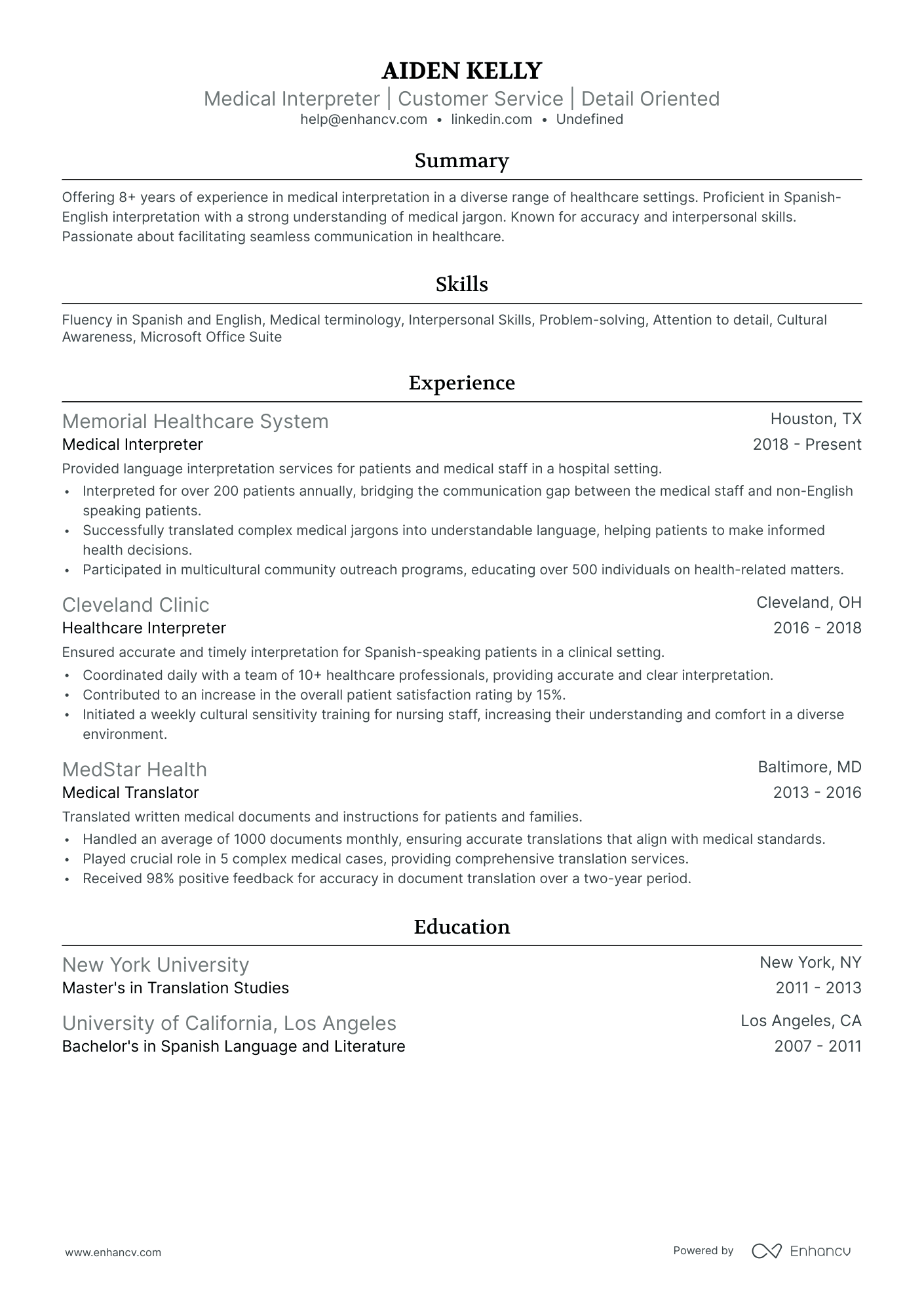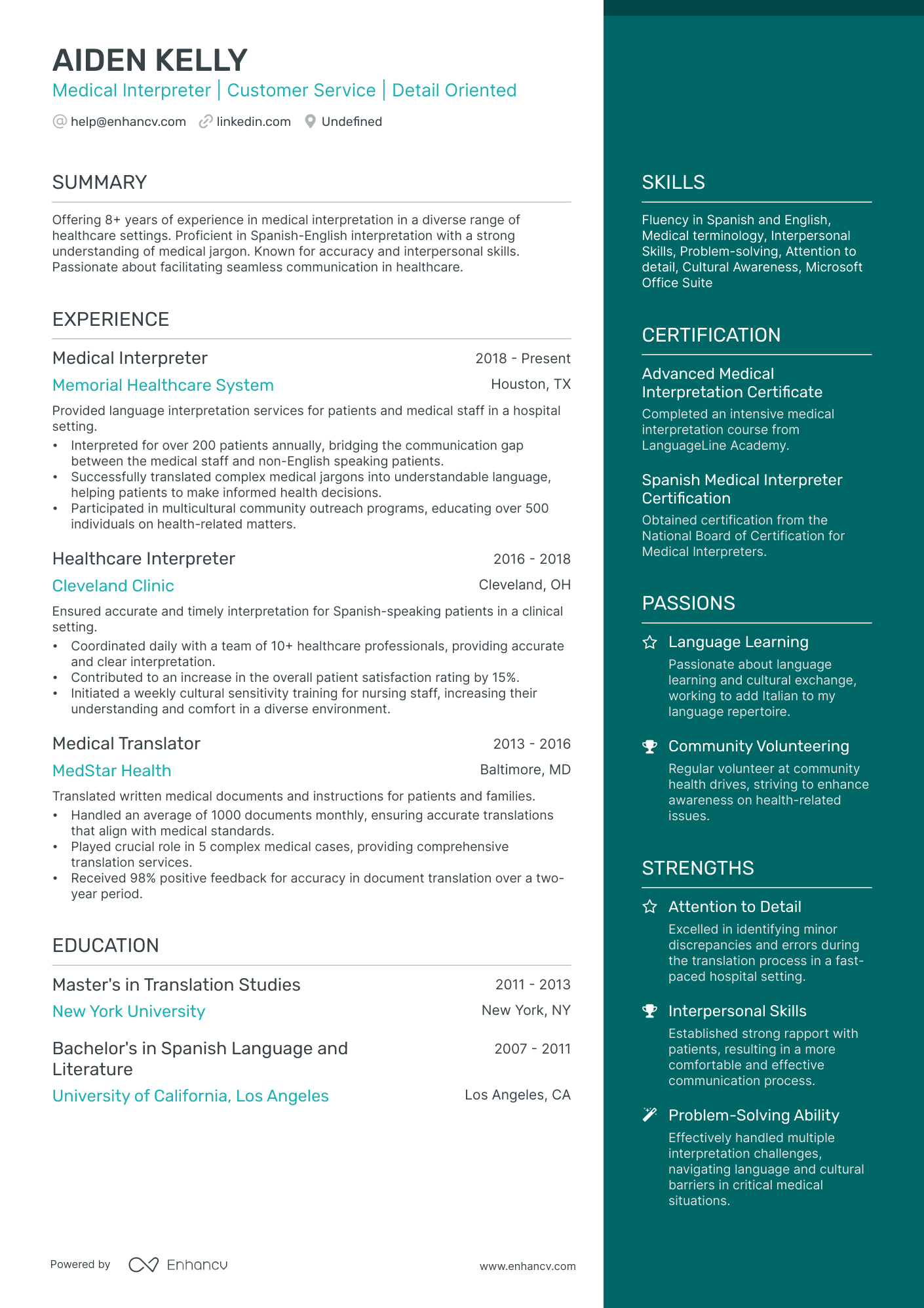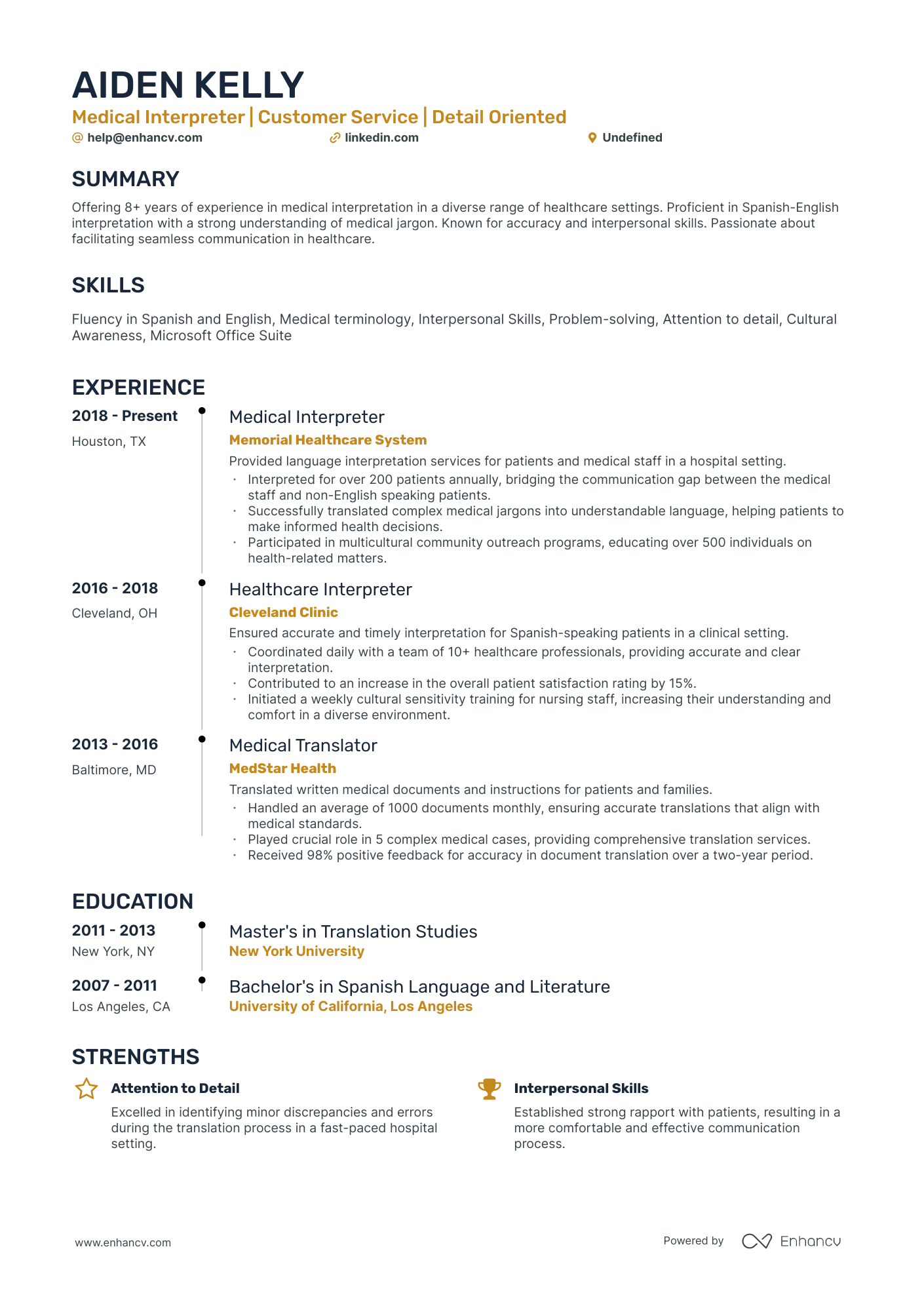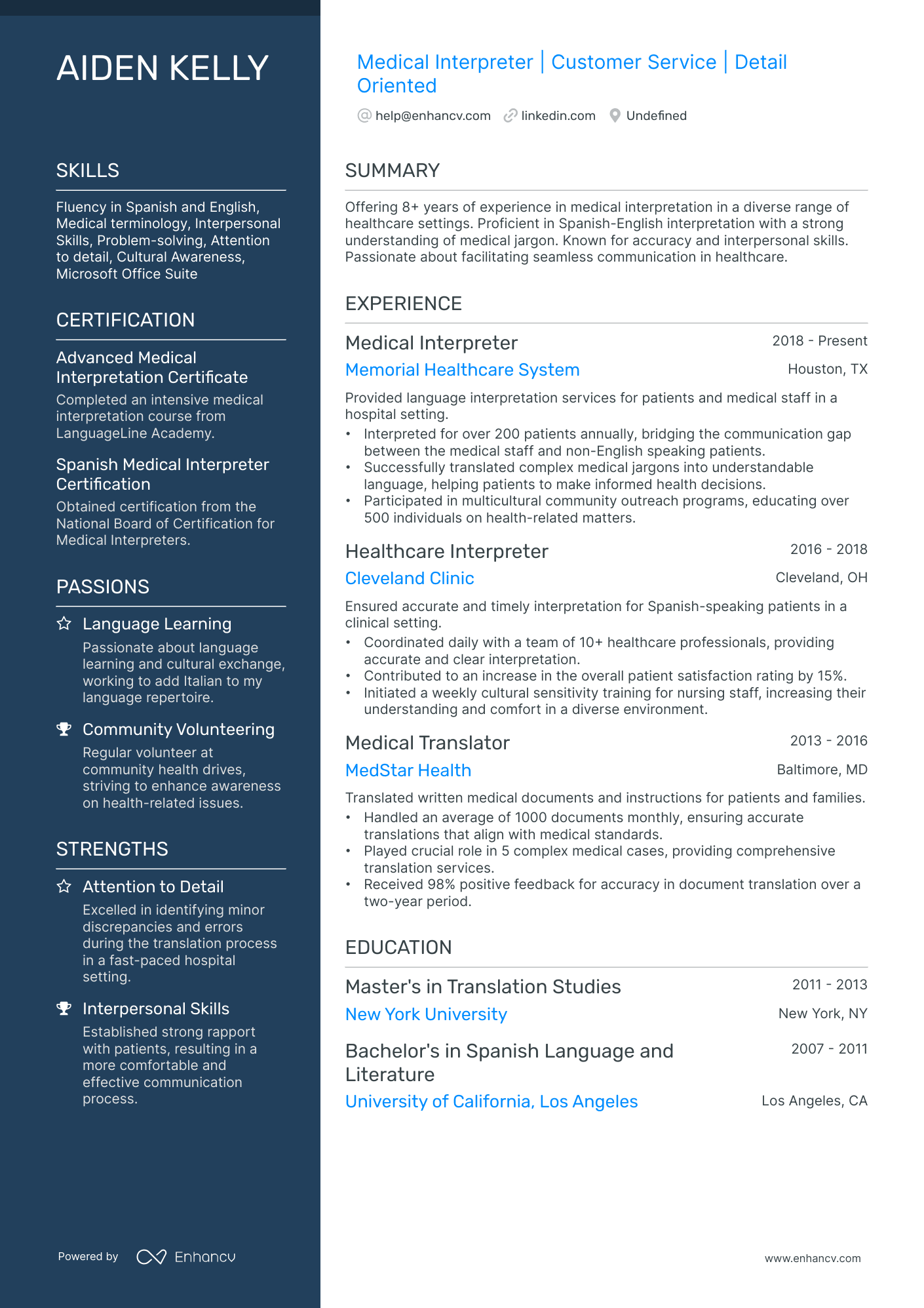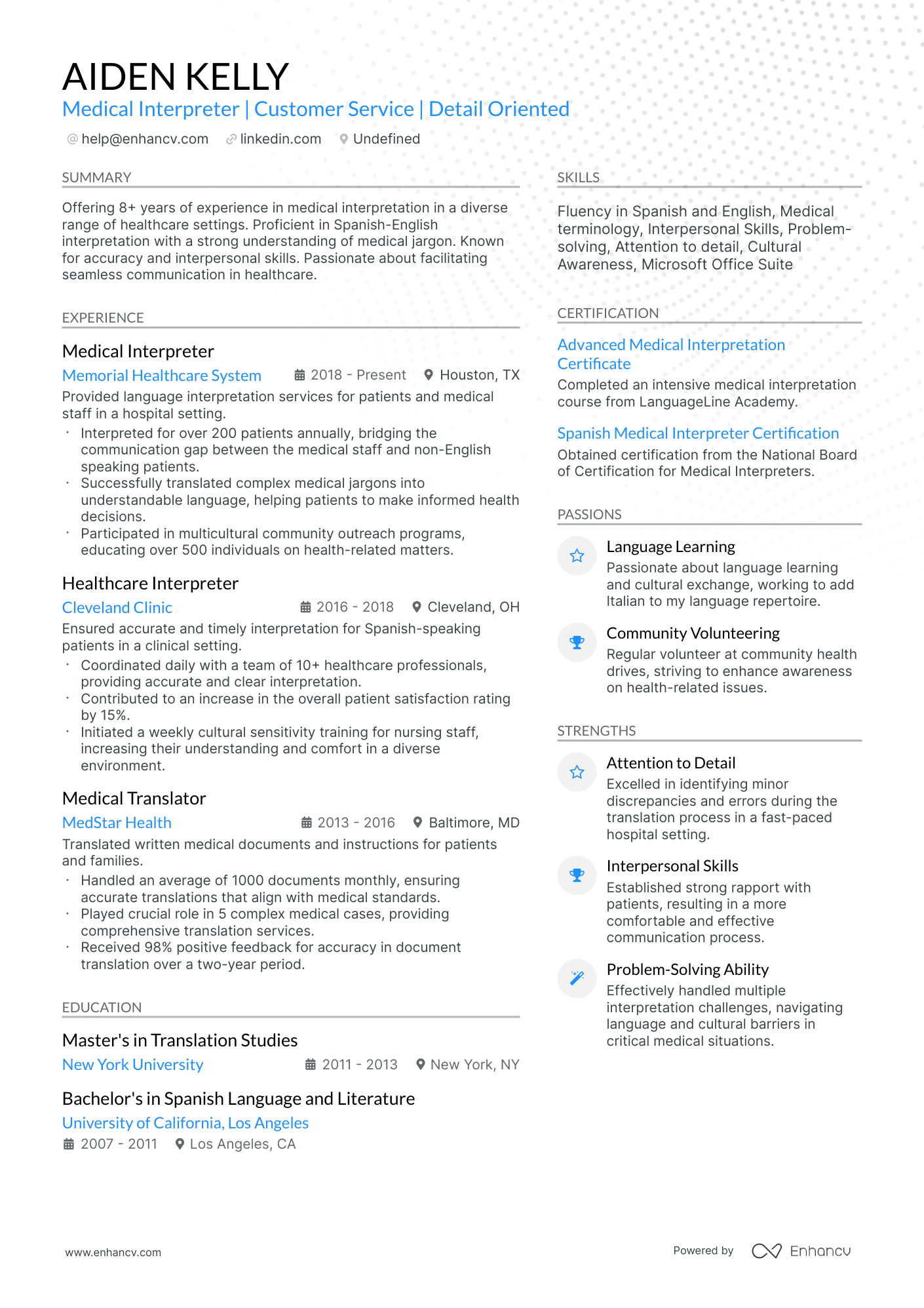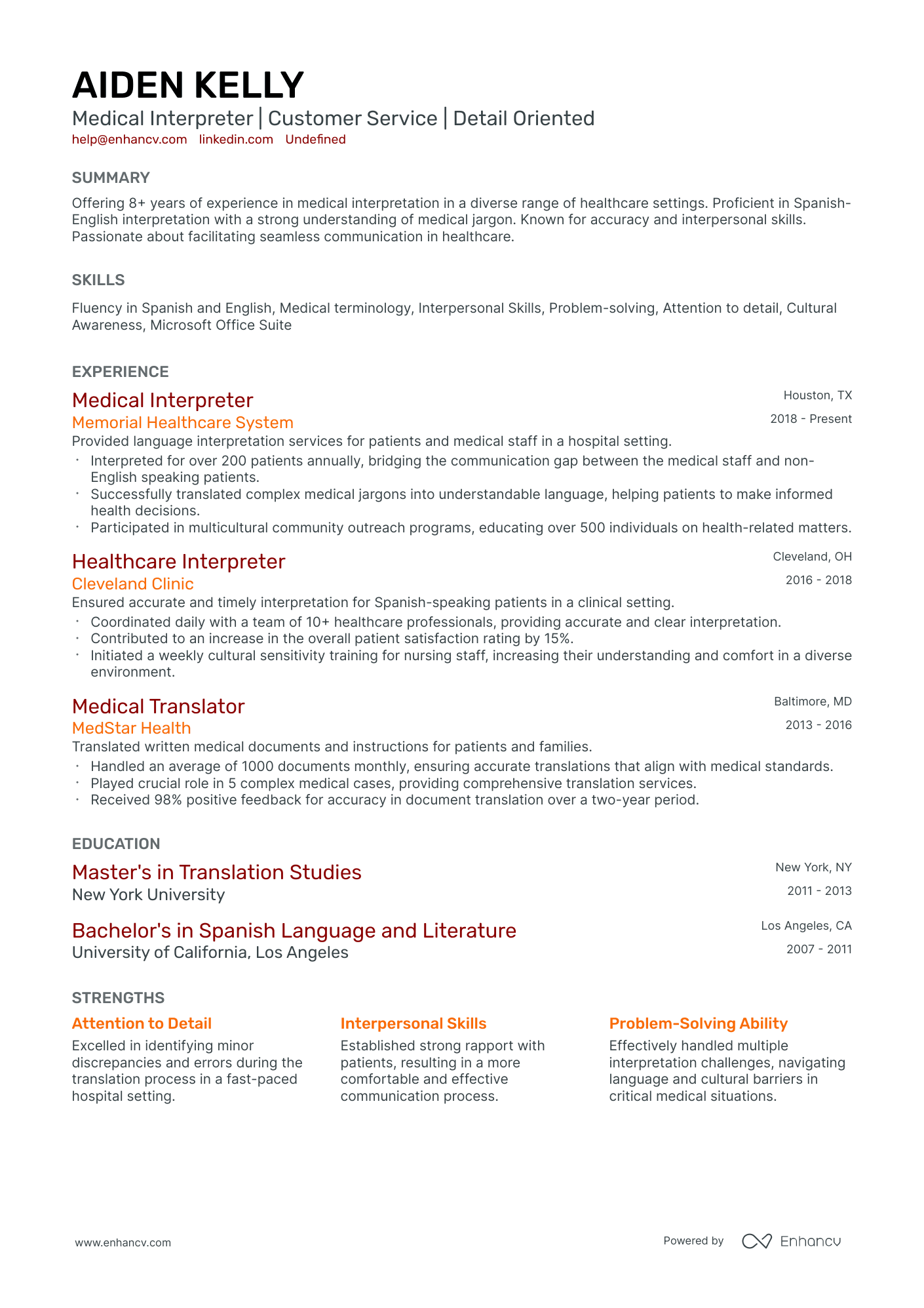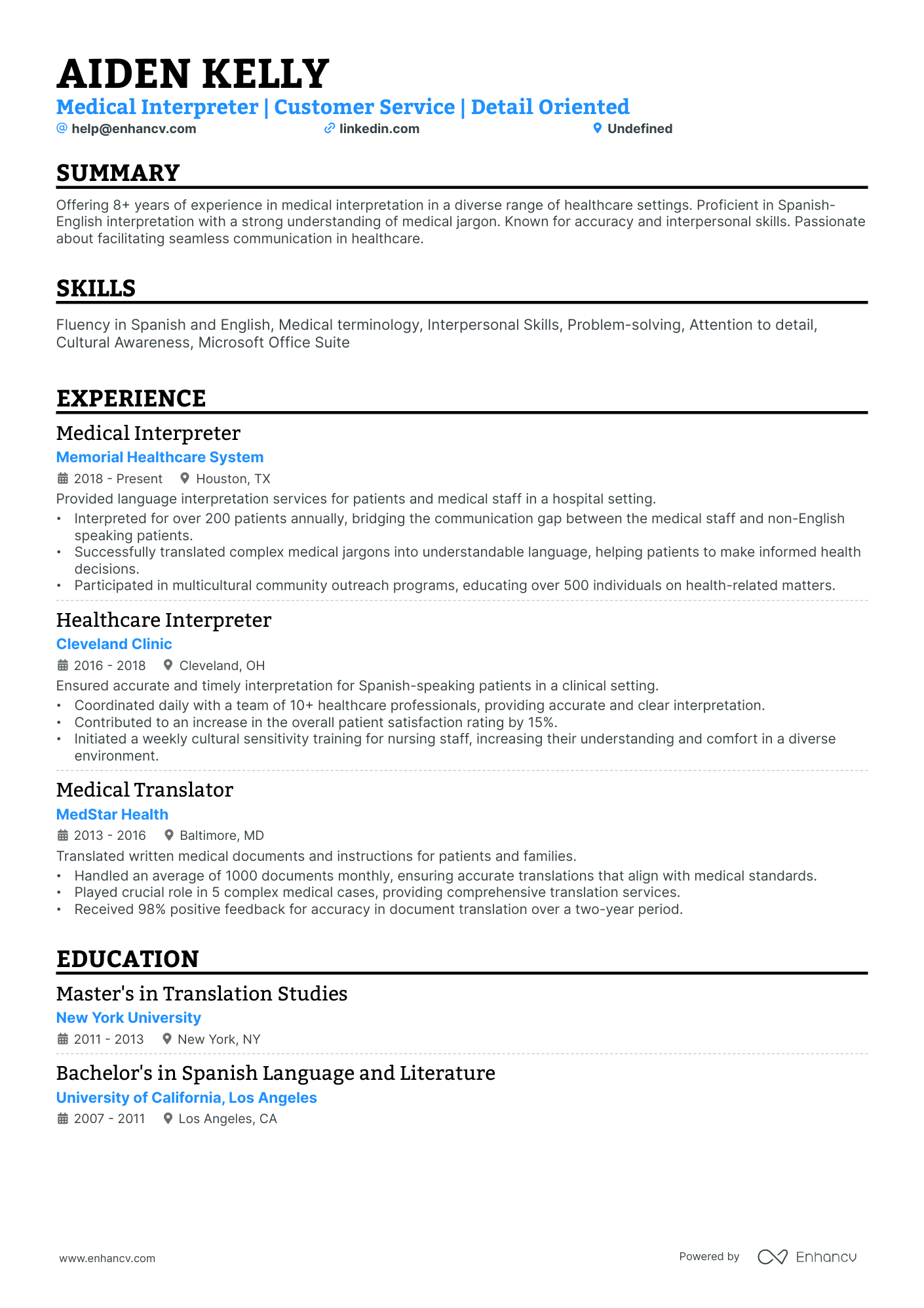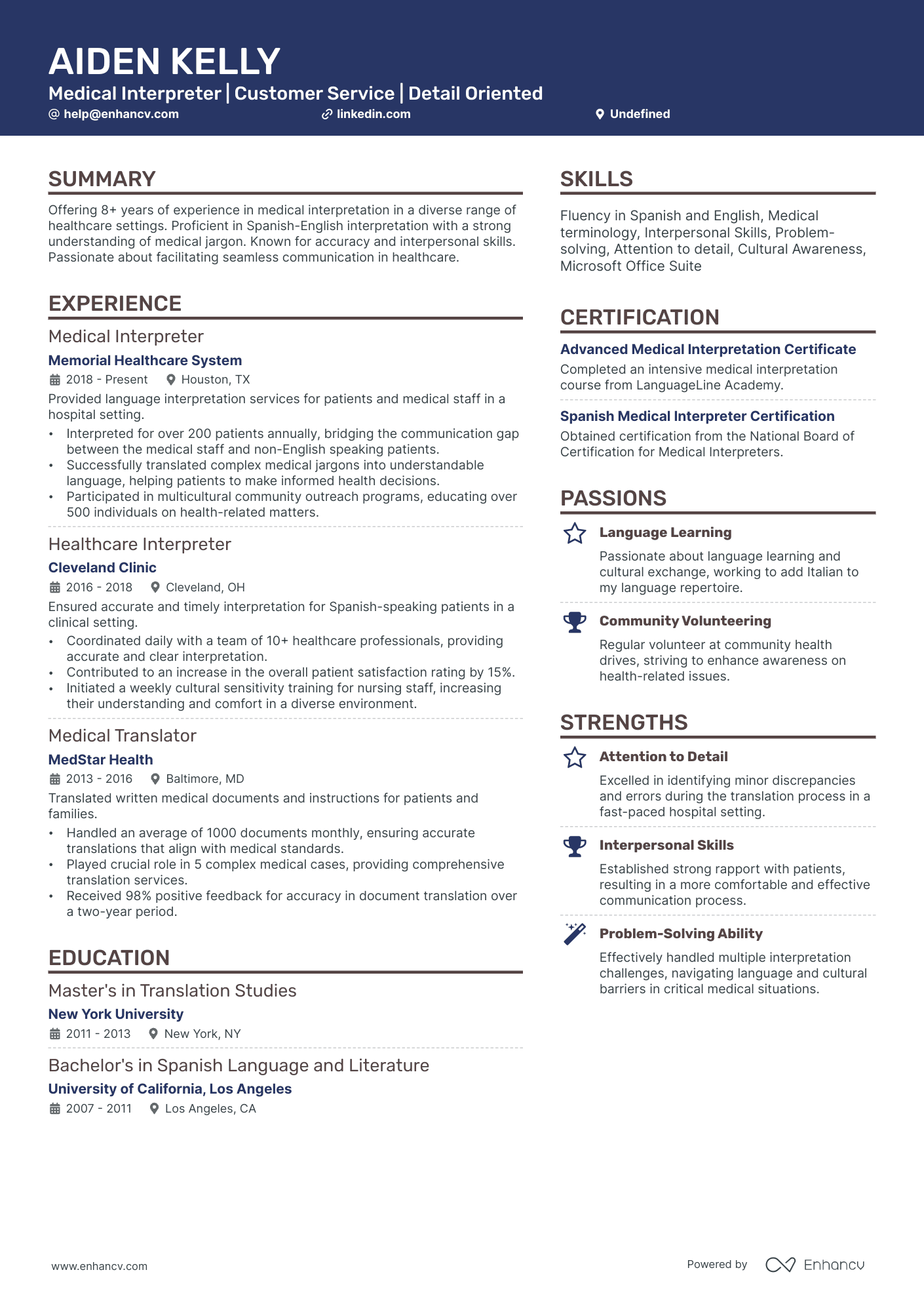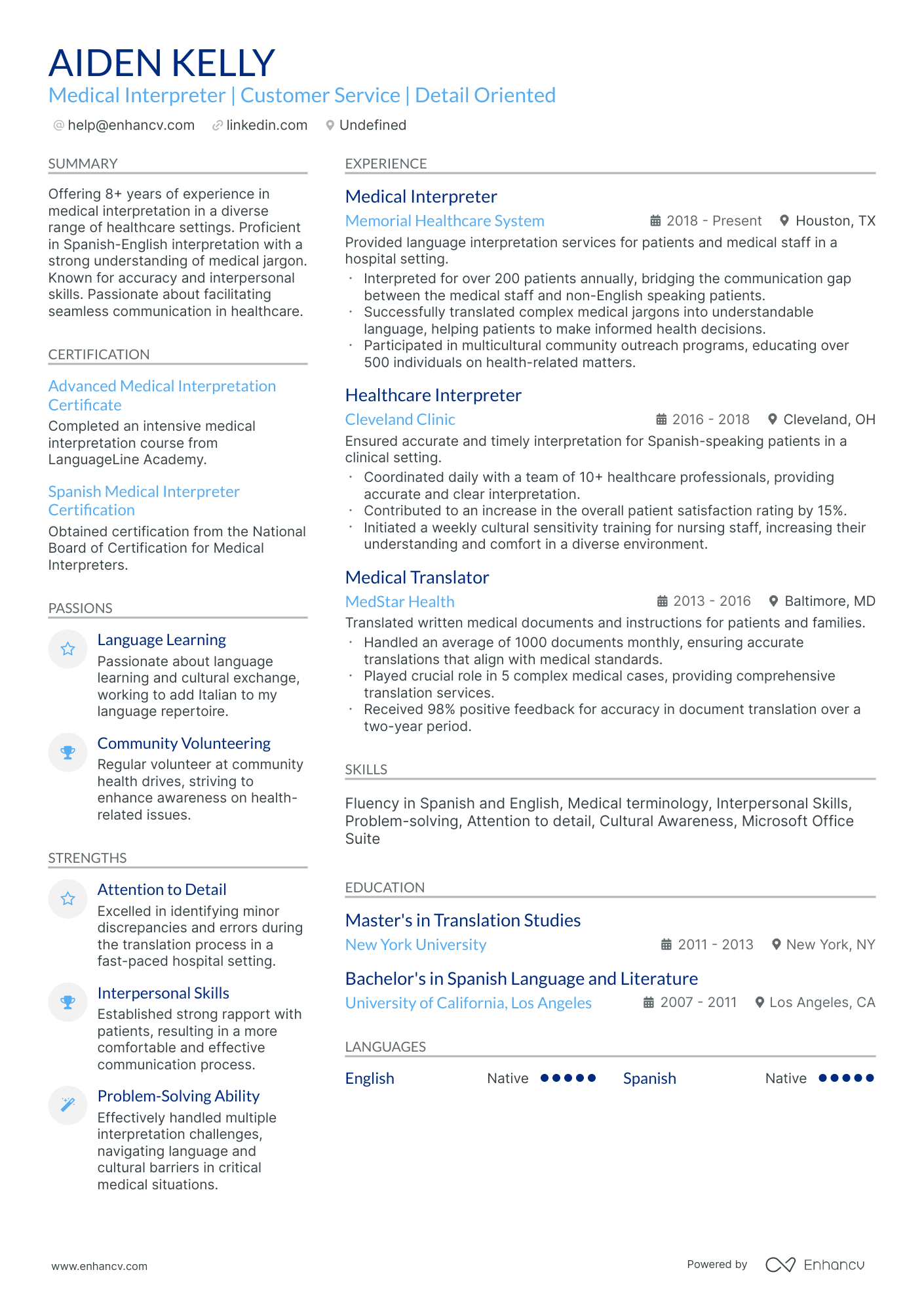Medical interpreters often struggle to effectively convey the depth and range of their language skills, medical knowledge, and cultural competence on resumes. Our guide can assist by providing sector-specific strategies and examples on how to illuminate these crucial elements, making your qualifications more tangible to potential employers.
Stay tuned for more ideas on how to write your medical interpreter resume:
- Find different medical interpreter resume examples to serve as inspiration to your professional presentation.
- How to use the summary or objective to highlight your career achievements.
- How to create the experience section to tell your story.
- Must have certificates and what to include in the education section of your resume.
Recommended reads:
crafting an impeccable medical interpreter resume format in four steps
Your medical interpreter resume format should be both strategic and reader-friendly. Here's a concise guide to help you achieve that:
- Choose a format that aligns with the job's requirements. If your expertise is directly relevant, the reverse-chronological format is ideal. If you're focusing more on skills, consider the functional or hybrid formats.
- Header: Ensure it's populated with accurate contact details and any relevant portfolio links.
- Length: A one-page resume is standard, but if you have extensive experience, extending to two pages is acceptable.
- File type: To maintain formatting consistency, always opt for PDF.
Remember, resume layouts can vary by country – for example, a Canadian resume format could look different.
Upload your resume
Drop your resume here or choose a file. PDF & DOCX only. Max 2MB file size.
Pro tip
Make sure your resume is ATS compliant and catches the recruiters' attention by tailoring your experience to the specific job requirements. Quantify and highlight why you're the best candidate for the role on the first page of your resume.
Key sections to include in your medical interpreter resume are:
- The header - with your contact details (like email and phone number), a link to your portfolio, and a headline.
- The summary (or objective) - highlighting the high points of your career so far.
- The experience section - limit yourself to six bullets per role to focus on specific results.
- The skills list - offering a balanced mix of your personal and professional talents.
- Education and certification - displaying your most relevant degrees and certificates for the medical interpreter role.
What recruiters want to see on your resume:
- Language Proficiency: Demonstrated fluency in at least two languages, including English and the specific language(s) needed for the position.
- Medical Knowledge: Understanding of medical terminology and ability to translate complex health-related concepts accurately.
- Certification: Credentials from an accredited interpreter certification program, particularly those focusing on healthcare interpreting.
- Cultural Competency: Awareness of cultural differences and sensitivities that could impact communication between patients and healthcare providers.
- Confidentiality: Evidence of understanding and adherence to patient confidentiality laws such as HIPAA (Health Insurance Portability and Accountability Act).
Recommended reads:
guide to your most impressive medical interpreter resume experience section
When it comes to your resume experience, stick to these simple, yet effective five steps:
- Show how your experience is relevant by including your responsibility, skill used, and outcome/-s;
- Use individual bullets to answer how your experience aligns with the job requirements;
- Think of a way to demonstrate the tangible results of your success with stats, numbers, and/or percentages ;
- Always tailor the experience section to the medical interpreter role you're applying for - this may sometimes include taking out irrelevant experience items;
- Highlight your best (and most relevant) achievements towards the top of each experience bullet.
You're not alone if you're struggling with curating your experience section. That's why we've prepared some professional, real-life medical interpreter resume samples to show how to best write your experience section (and more).
- Provided medical interpreting services in English and Spanish for patients and healthcare professionals at ABC Hospital.
- Interpreted complex medical terminology accurately during patient consultations resulting in improved communication between doctors and non-English speaking patients.
- Collaborated with the hospital's multicultural team to develop and implement language access programs, ensuring effective communication for diverse patient populations.
- Served as a Medical Interpreter at XYZ Clinic, facilitating communication between Mandarin-speaking patients and healthcare staff.
- Translated medical documents such as discharge summaries, consent forms, and medication instructions, ensuring accurate and culturally appropriate information exchange.
- Assisted in training new interpreters on medical terminologies and cultural sensitivities, contributing to an efficient and knowledgeable interpreting team.
- Worked as a Bilingual Medical Interpreter at DEF Medical Center, providing interpretation services in French and English.
- Conducted consecutive and simultaneous interpreting during medical appointments, surgeries, and emergency situations, ensuring smooth communication between patients and healthcare providers.
- Collaborated with social workers to assist refugee patients, ensuring their understanding of medical procedures and facilitating access to essential healthcare services.
- Acted as a Lead Medical Interpreter at Global Health Services, overseeing a team of interpreters and coordinating language services for a diverse patient population.
- Developed and implemented a comprehensive medical glossary in multiple languages, improving accuracy and consistency in interpretations across the organization.
- Collaborated with IT department to integrate video conferencing technology, enabling remote interpreting services and expanding accessibility for patients.
- Provided on-site and telephonic interpretation services as a Remote Medical Interpreter for PQR Language Solutions.
- Effectively interpreted during emergency room situations, ensuring prompt and accurate communication between healthcare professionals and limited-English proficient patients.
- Contributed to the development of a training program for new interpreters, focusing on medical terminology, cultural competence, and ethical standards.
- Currently working as a Senior Medical Interpreter at LMN Medical Center, providing interpretation services in ASL and spoken English for deaf and hard-of-hearing patients.
- Advocate for language access and disability rights, collaborating with hospital administration to implement policies that ensure effective communication and equal access to healthcare.
- Developed a specialized medical sign language glossary, improving comprehension and accuracy in interpretations for deaf patients with complex medical conditions.
- Worked as a Per Diem Medical Interpreter at MNO Community Clinic, providing on-demand interpretation services in Arabic and English.
- Assisted in the coordination of language services for large-scale community health events, reaching diverse populations resulting in increased accessibility to healthcare resources.
- Translated patient education materials into Arabic, increasing patient comprehension and adherence to treatment plans.
- Served as a Telephone Medical Interpreter for HIJ Language Services, facilitating communication between limited-English proficient patients and healthcare providers via phone.
- Achieved high customer satisfaction ratings by delivering clear and accurate interpretations while maintaining strict confidentiality standards.
- Provided cultural insights to healthcare professionals, enhancing their understanding of diverse patient backgrounds and promoting culturally sensitive care.
- Acted as a Contract Medical Interpreter at KLM Hospital, providing interpreting services in Russian and English across various medical departments.
- Interpreted during complex surgical procedures, ensuring precise communication between surgeons, anesthesiologists, and non-English speaking patients.
- Supported hospital's research team by translating scientific articles and assisting with interviews of non-English speaking study participants.
- Worked as an Onsite Medical Interpreter for NOP Language Solutions, providing interpretation services in Korean and English at multiple healthcare facilities.
- Assisted in the implementation of a patient-centered care initiative, facilitating effective communication between patients, families, and medical staff resulting in improved patient satisfaction scores.
- Provided cultural competency training to healthcare professionals, promoting awareness and understanding of diverse patient needs.
The following content includes information from "O*NET OnLine" by the U.S. Department of Labor, Employment and Training Administration (USDOL/ETA). Used under the CC BY 4.0 license. The data represents the top responsibilities present on the task lists for medical interpreter professionals.
Top Responsibilities for Medical Interpreter:
- Translate messages simultaneously or consecutively into specified languages, orally or by using hand signs, maintaining message content, context, and style as much as possible.
- Listen to speakers' statements to determine meanings and to prepare translations, using electronic listening systems as necessary.
- Compile terminology and information to be used in translations, including technical terms such as those for legal or medical material.
- Refer to reference materials, such as dictionaries, lexicons, encyclopedias, and computerized terminology banks, as needed to ensure translation accuracy.
- Check translations of technical terms and terminology to ensure that they are accurate and remain consistent throughout translation revisions.
- Identify and resolve conflicts related to the meanings of words, concepts, practices, or behaviors.
- Compile information on content and context of information to be translated and on intended audience.
- Adapt translations to students' cognitive and grade levels, collaborating with educational team members as necessary.
- Check original texts or confer with authors to ensure that translations retain the content, meaning, and feeling of the original material.
- Adapt software and accompanying technical documents to another language and culture.
Quantifying impact on your resume
<ul>
No experience, no problem: writing your medical interpreter resume
You're set on the medical interpreter role of your dreams. Yet, you have little to no work experience . Here's how you can curate your resume to substitute your lack of experience:
- Don't list every single role you've had so far, but focus on the ones that align with the job you're applying for
- Include any valid experience in the field - whether it's a university research project, or a summer internship
- Highlight the soft skills you're bringing along - those that will have an added value to your application.
- Focus on your education and certifications, especially if they make sense for the role.
Recommended reads:
Pro tip
The wording of your experience items should be with active, power verbs, instead of adjectives. Always be specific about each item you detail, and never overuse vague buzzwords. You weren't just "organized", but rather "Enhanced internal work processes to optimize operational management by 65%".
Highlighting your hard and soft skills on your medical interpreter resume
The skills section of your medical interpreter resume should showcase your capabilities that align with job requirements.
Your hard skills, or technical skills, demonstrate your proficiency with technological innovations and specific software. On the other hand, your soft skills illustrate how you'd excel in the workplace environment with personal attributes like resilience, negotiation, and organization.
For a well-rounded medical interpreter resume, it's essential to include both. Here's how to craft a standout skills section:
- Prioritize skills listed at the top of the job advert.
- Highlight unique skills you've honed over time.
- Choose soft skills that resonate with the company or department culture.
- Address essential job requirements by listing key skills for the medical interpreter role that haven't been mentioned elsewhere in your resume.
Check out our sample skill list for medical interpreter to get ideas on the most sought-after hard and soft skills in the industry.
Top skills for your medical interpreter resume:
Medical terminology knowledge
Bilingual proficiency
Interpretation software proficiency
Cultural competence
Note-taking skills
Voice modulation techniques
Telehealth platforms
Documentation tools
Translation software
Patient privacy laws knowledge
Active listening
Empathy
Attention to detail
Interpersonal communication
Problem-solving
Adaptability
Stress management
Conflict resolution
Team collaboration
Time management
Next, you will find information on the top technologies for medical interpreter professonals from "O*NET OnLine" by the U.S. Department of Labor, Employment and Training Administration (USDOL/ETA). Used under the CC BY 4.0 license.
Top technologies for Medical Interpreter’s resume:
- Extensible hypertext markup language XHTML
- Hypertext markup language HTML
- Microsoft PowerPoint
- AceTools.biz Ace Translator
- Stormdance CatsCradle
Pro tip
If the job emphasizes team or organizational culture, dedicate a section of your resume to underscore your strengths and achievements. Top-tier medical interpreter candidates also highlight their alignment with a company's values and culture.
Detailing your education and top medical interpreter certifications on your resume
Your education section can reflect a variety of skills and experiences relevant to the position.
- List post-secondary qualifications, noting the institution and duration.
- If you're currently studying, mention your expected graduation date.
- Exclude qualifications unrelated to the role or industry.
- If relevant, delve into your educational background, especially if it was research-intensive.
Including both relevant education and certifications on your medical interpreter resume can set you apart. It not only showcases your qualifications but also your commitment to the profession.
When listing these on your medical interpreter resume, make sure to:
- Highlight degrees and certificates relevant to the role.
- Mention the awarding institution for credibility.
- Include the start and end dates, or if the education/certification is ongoing.
- If relevant, incorporate a few keywords from the job advert within the description of the certification or degree.
If you have additional certifications not directly related to the role, consider placing them towards the end of your resume. This way, they can be viewed as personal interests rather than core qualifications.
For a quick update, check out our list of popular medical interpreter certifications curated by the Enhancv team.
Best certifications to list on your resume
Pro tip
The reputation of the institution or organization granting your certification or degree can bolster your credibility. Prioritize recognized and respected credentials.
Recommended reads:
Choosing the right medical interpreter resume summary or objective
The top section of your resume is pivotal. It should encapsulate your alignment with the job, your unique skill set, and your professional expertise.
Both the resume summary and resume objective can serve this purpose:
- Use the resume objective to spotlight your current achievements and future aspirations. Highlight how you envision your growth in the prospective role.
- Opt for the resume summary to succinctly present your most relevant professional highlights. Aim for brevity, ideally within five sentences.
Ultimately, these sections offer a glimpse into your professional persona and the unique value you bring.
Resume summary and objective examples for a medical interpreter resume
- With a 10-year career as an ER nurse, I bring a robust medical vocabulary and an in-depth understanding of healthcare protocols to the medical interpreter role. I am fluent in Spanish and English, experienced in patient advocacy, and possess an innate ability to alleviate tense situations. Significant achievement includes creating a bilingual patient education program that improved treatment adherence rates by 30%.
- A former social worker with five years of experience advocating for non-English-speaking populations seeks to leverage this background into the medical interpreter field. Fluent in Mandarin Chinese and English, my success lies in bridging communication gaps and fostering trust while ensuring accurate medical interpretation.
- Transitioning from a distinguished 7-year teaching career, I am pursuing a new path in the healthcare sector as a medical interpreter. My fluency in Arabic and English, coupled with a strong knowledge of medical terminology acquired via extensive self-study, will allow me to serve effectively in this capacity. My greatest achievement has been successfully navigating cultural barriers to education in a diverse classroom environment.
- As a Licensed Practical Nurse with eight years of hands-on experience in providing patient care, I am now seeking to combine my medical expertise with my proficiency in French and English as a medical interpreter. My standout accomplishment was leading a team to develop a streamlined patient intake process that increased efficiency by 25%.
- Eager to embark on a career as a medical interpreter, I am utilizing my fluency in Portuguese and English, along with my Bachelor's degree in Linguistics. My objective is to employ my linguistic skills and cultural sensitivity to ensure clear, accurate communication between patients and healthcare providers.
- A recent graduate with a Master’s in Public Health and fluency in Russian and English, I aim to apply my academic knowledge to a practical setting as a medical interpreter, enhancing healthcare delivery through effective communication and empathy.
Four additional sections to consider for your medical interpreter resume
To give a fuller picture of who you are, consider adding these sections to your medical interpreter resume:
- Awards - to showcase your achievements.
- Interests - to share passions outside of work.
- Publications - to highlight your contributions to the field.
- Projects - to spotlight significant accomplishments, even those outside of traditional work settings.
Key takeaways
- Effective medical interpreter resumes are well-structured, weaving a compelling career narrative.
- Choose between a resume summary or objective based on your experience and the impression you aim to create.
- If lacking in direct experience, leverage other roles, such as internships or contract positions, to demonstrate alignment with the medical interpreter role.
- Be discerning in listing hard and soft skills, ensuring relevance and showcasing outcomes.
- Always tailor your resume for each medical interpreter application, ensuring alignment with job requirements.
